The long-term correlation between Bitcoin price and financing amount will not disappear until 2023.
Article: insights4.vc
Translated by: Felix, PANews
This article will introduce the dynamic evolution of venture capital in the blockchain-related entities over the past 15 years, focusing on the transformation of companies towards liquidity investment. In these investments, VCs did not acquire equity, but tokens with ownership plans. In addition, it will list well-known investment institutions like a16z making their first investments in the crypto field, such as their investment in OpenCoin (later Ripple Labs) in April 2013.
In the early stages of Bitcoin development, from 2009 to 2012, venture capital had little interest in the crypto field. Therefore, this article will start the analysis from 2012. It is also worth noting that the long-term correlation between Bitcoin price and financing amount will not disappear until 2023.
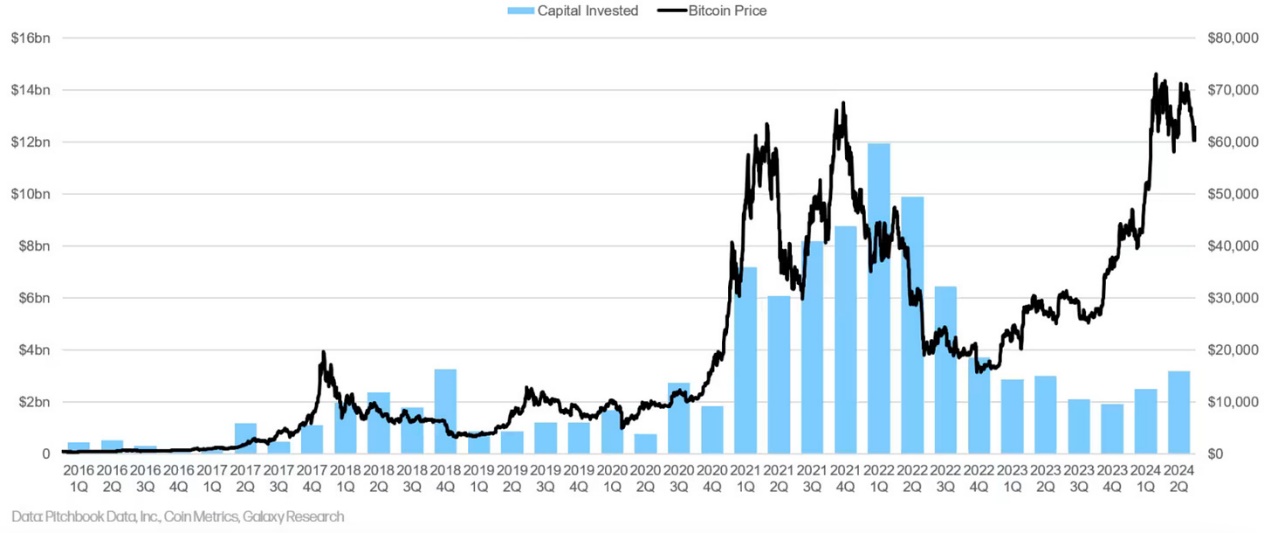
Venture Capital and Bitcoin Price
2009 - 2018: The first 10 years of Bitcoin and VC's start investing in the blockchain field
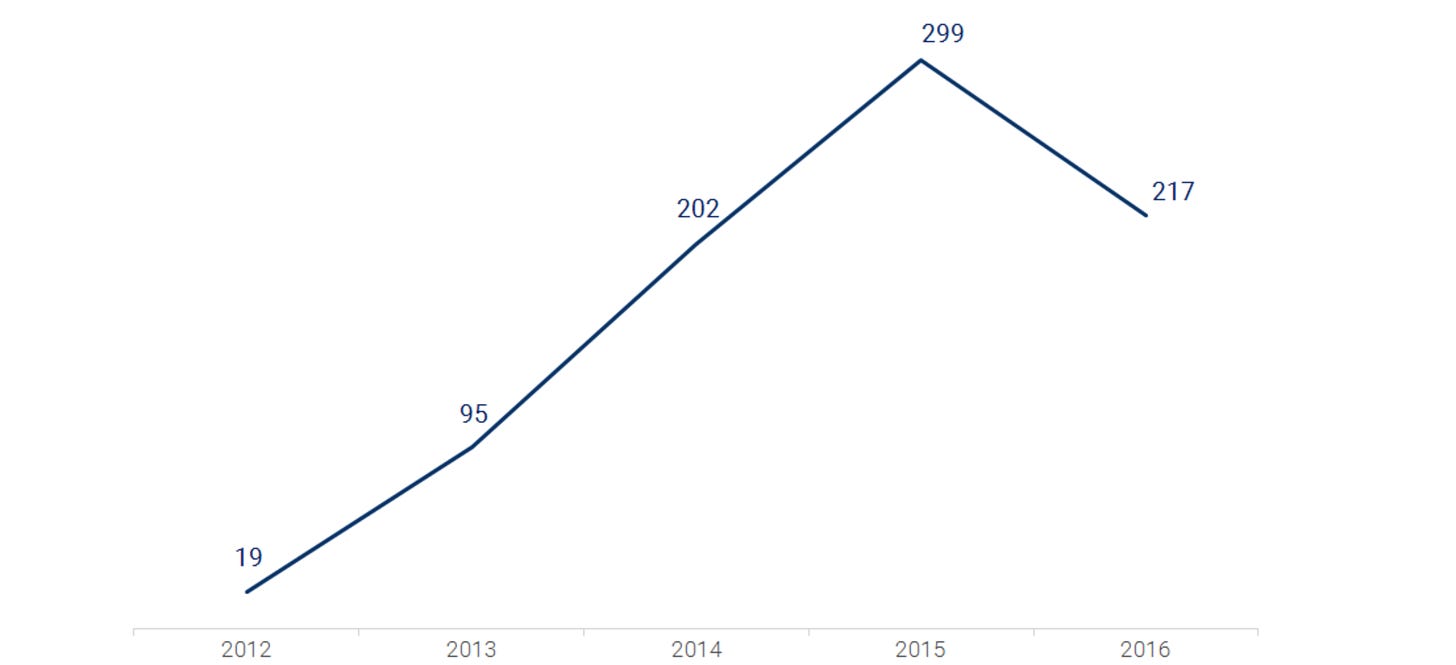
Bitcoin and independent investors in the blockchain (CBINSIGHTS)
The venture capital landscape for Bitcoin and crypto projects began to take shape in the early 2010s. Union Square Ventures (USV) led by Fred Wilson and Andreessen Horowitz (a16z) were among the earliest companies to invest in blockchain projects, with both companies investing in Coinbase in 2013.
Ribbit Capital, founded by Meyer "Micky" Malka in 2012, focused on disruptive financial technology and was also an early investor in Bitcoin-related companies such as Coinbase. Boost VC, founded by Adam Draper in 2012, was initially an accelerator and venture fund for emerging technologies, including Bitcoin and blockchain startups. Lightspeed Venture Partners invested in Blockchain.info (now Blockchain.com) in 2013.
Other notable early funds include Bitcoin Opportunity Corp, founded by Barry Silbert in 2013, and Pantera Capital, which shifted its focus to Bitcoin and blockchain in 2013. Blockchain Capital, founded by Bart Stephens, Brad Stephens, and Brock Pierce in 2013, was one of the first companies to focus on blockchain and cryptocurrency investments.
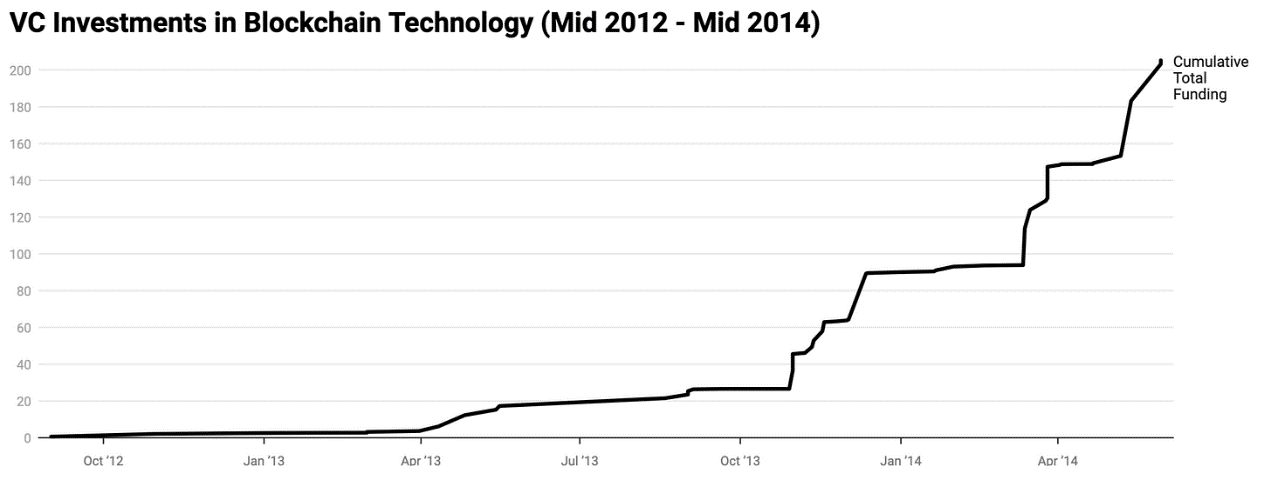
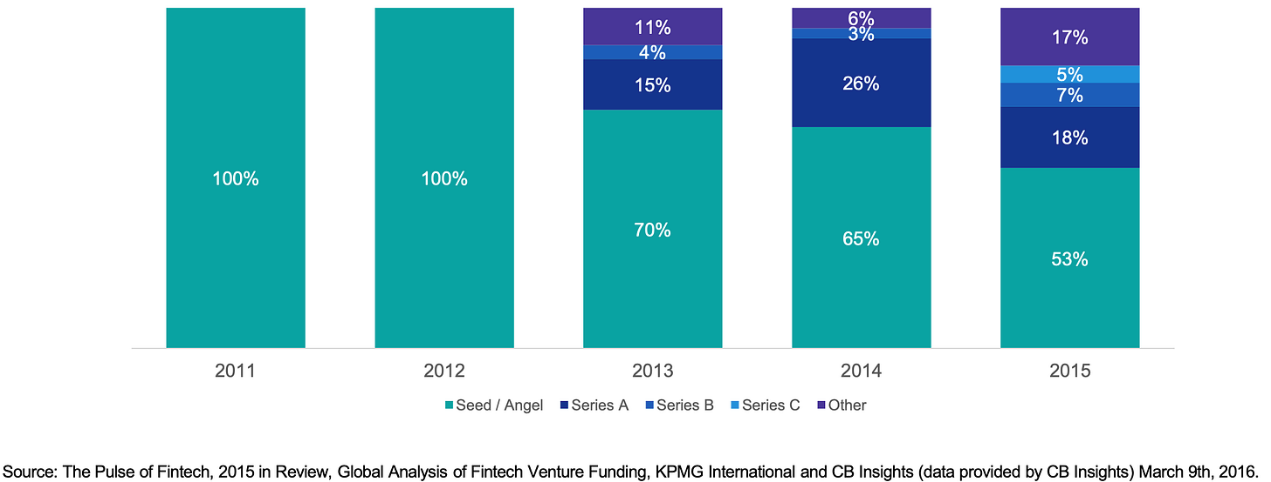
Blockchain and Bitcoin trading volume by year (2011 - 2015)
2012
Bitcoin startups only received $2.1 million in investments.
2013
Important milestones include:
- Coinbase: Largest single financing, supported by Andreessen Horowitz, Union Square Ventures, and Ribbit Capital. Coinbase is now a publicly traded company and a key player in the Bitcoin field.
- BTC China: China's largest and earliest Bitcoin exchange, received $5 million in financing from Lightspeed China. Despite the eventual failure of this investment, it remains an important part of China's early crypto history.
- Circle Internet Financial: Circle was initially a Bitcoin app company, raising $9 million from Breyer Capital and Accel Capital. Jeremy Allaire's goal was to promote the use of Bitcoin, similar to Skype or email. Circle later became known for issuing USDC in 2018.
Investments and major breakthroughs:
Total venture capital in 2013: $88 million, a significant increase from the previous year.
Major breakthroughs in 2013:
- In November, the price of Bitcoin first exceeded $1,000.
- The first Bitcoin ATM was launched at Waves Coffee in Vancouver.
- Bitcoin's mining power surged from 20 Th/s to 9,000 Th/s.
Notable venture capital firms and projects:
- Union Square Ventures: Invested in significant projects such as Protocol Labs, Dapper Labs, Arweave, Polygon, zkSync, Polychain, and Multicoin Capital.
- Ribbit Capital: Active in early industry investments, supporting projects like Ethereum, AAVE, and Arbitrum.

The 5 largest blockchain startups financing in 2013
2014
In June 2014, the financing amount in the blockchain industry exceeded the total amount for the entire year of 2013, reaching $314 million, a 3.3-fold increase from the $93.8 million in 2013.
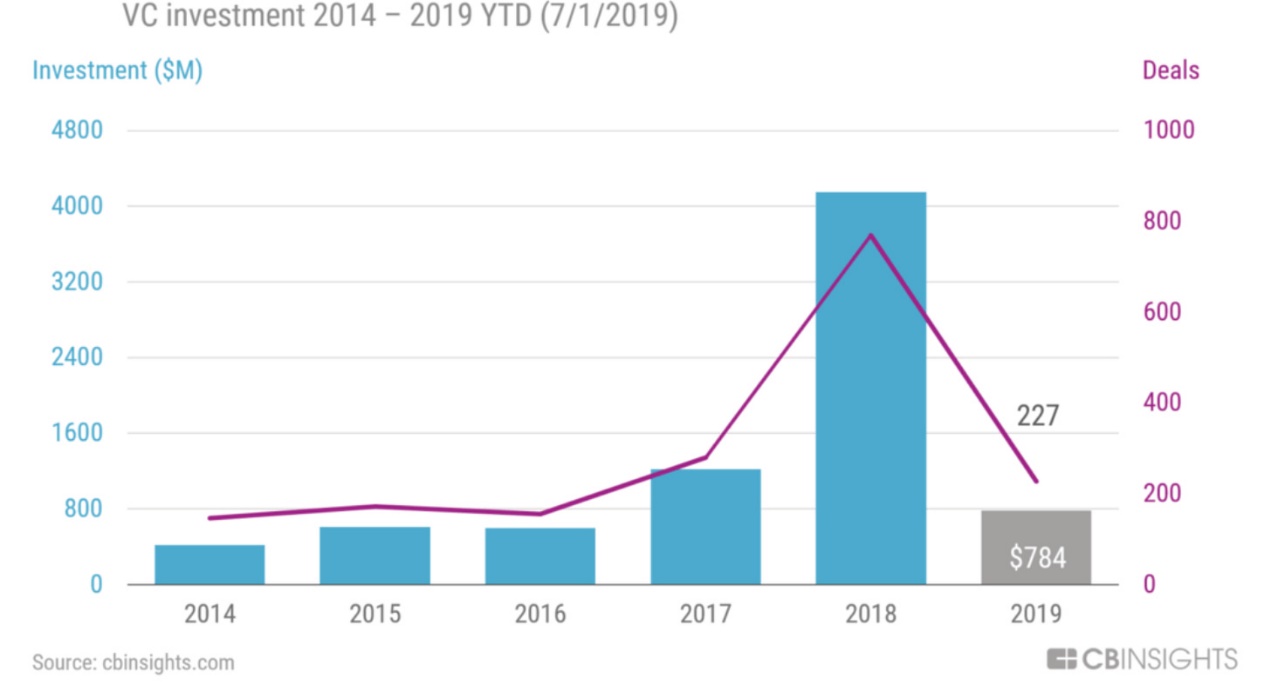
500 Startups became the most active investment institution, supporting Bitcoin application companies along with Boost VC, Plug and Play Technology Center, and CrossCoin Ventures. 500 Startups initially focused on the crypto industry before shifting to early-stage investments.
Significant investments in Bitcoin applications included:
- Blockchain: $30.5 million
- BitPay: $30 million
- Blockstream: $21 million
- Bitfury: $20 million
The Bitcoin payment platform BitPay raised $30 million in financing, led by Index Ventures, with participation from AME Cloud Ventures, Horizons Ventures, and Felicis Ventures.
Blockstream focuses on the Lightning Network, a major innovation in Bitcoin payments, and has developed the c-lightning client and the Bitcoin sidechain Liquid.
OKcoin (now OKX) raised $10 million in financing, with investors including Ceyuan Ventures, Mandra Capital, and venturelab. It is worth noting that Ceyuan's co-founder Feng Bo founded Dragonfly Capital in 2018, which launched a large number of crypto funds in the following years.
Overall, crypto venture capital steadily increased in 2014.
2015
Despite the decline in Bitcoin's price from its peak in 2013, blockchain technology attracted increasing capital and entrepreneurial interest. The total financing for Bitcoin startups reached $380 million.
Major financings included:
- Coinbase: $75 million Series C financing
- Circle: $50 million Series C financing
- BitFury: $20 million Series B financing
- Chain: $30 million Series B financing, including strategic investors such as Visa and Nasdaq
Ripple Labs (formerly OpenCoin) raised $28 million in Series A financing, while 21 Inc. received $116 million from a16z, Qualcomm, Cisco, and PayPal.
Canada's OMERS Ventures announced plans to invest in blockchain, demonstrating growing institutional interest. Notable active venture capital firms included a16z, Union Square Ventures, Ribbit Capital, Boost VC, and DCG.
The investment activity in 2015 highlighted continued participation in the capital market despite the bear market.
2016
With a decrease in fintech investments, venture capital in the crypto market also declined. According to CB Insights data, financing activities for Bitcoin and blockchain startups decreased by 27% compared to 2015, returning to 2014 levels.
Despite the decrease in investment activity, the total financing reached $550 million, mainly invested in more mature companies. Major financings included:
- Circle: $60 million Series D financing
- Digital Asset Holdings: $60 million Series A financing
- Ripple: $55 million Series B financing
- Blockstream: $55 million Series A financing
Circle shifted from Bitcoin trading services to remittance and payment services, paving the way for its stablecoin. Polychain Capital, founded by former Coinbase employee Carlson-Wee, raised $750 million for its third venture fund with support from a16z, Union Square Ventures, and Sequoia Capital.
In 2016, project financing based on ICOs began to grow, with The DAO raising $150 million, marking the beginning of the ICO boom.
2017
Liquidity Investment
Driven by the ICO boom and interest in tokenized assets, around 2017-2018, the venture capital landscape for liquidity investment began to take shape. Pioneer funds such as Polychain Capital, founded by Olaf Carlson-Wee in 2016, and MetaStable Capital, co-founded by Naval Ravikant, focused on tokens rather than equity. Pantera Capital launched an ICO fund in 2017, targeting ICO and token projects, while Blockchain Capital introduced the BCAP token, a security token representing its fund shares. Multicoin Capital, founded by Kyle Samani and Tushar Jain in 2017, and 1confirmation, led by former Coinbase employee Nick Tomaino, also emphasized token investments. Amentum Investment Management joined in 2017, focusing on long-term capital appreciation through blockchain and token economy investments. These funds recognized the potential of tokenized assets and shifted from traditional equity models to token strategies with strong liquidity.
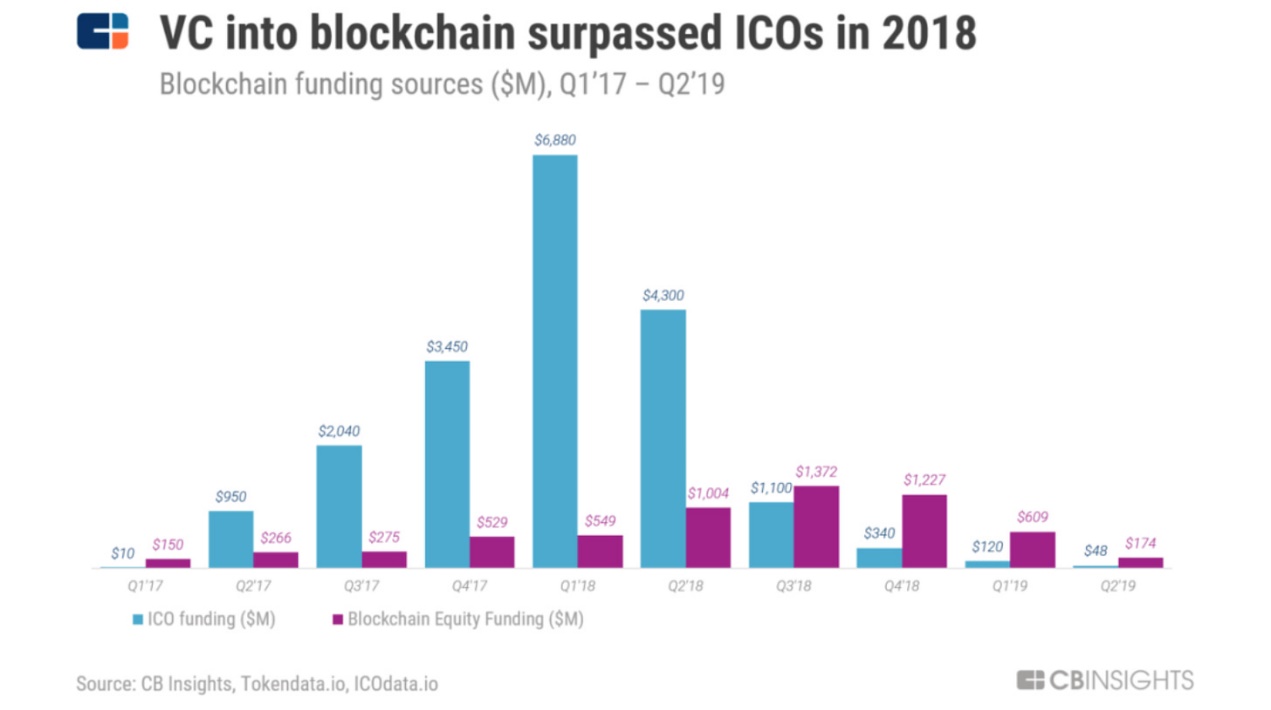
In 2017, the blockchain industry experienced a period of fervor alongside regulation. The Ethereum ERC-20 protocol sparked the ICO boom, but regulation led the crypto industry into a prolonged bear market.
Performance of ICOs and VCs:
- Q1 2017: 19 ICOs raised $21 million
- Q4 2017: Over 500 ICOs raised nearly $3 billion
- Full year 2017: ICOs raised $5 billion in nearly 800 projects, 5 times the $1 billion VC investment in 215 deals
Notable ICO projects:
- Filecoin: $257 million
- Tezos: $232 million
- Bancor: $152.3 million
- Polkadot: $140 million
- Quoine: $105 million
Institutions such as Union Square Ventures and Blockchain Capital were attracted by the rapid returns and also participated in ICOs.
Geographical distribution:
- EU: 40% of ICOs, raising $1.76 billion
- North America: $1.076 billion
- After the introduction of regulatory policies, Chinese venture capital firms shifted to regions such as Hong Kong and Singapore. Due to regulatory pressure and unsustainable business models, the ICO bubble burst.
2018
ICO activity continued into 2018, with over 400 projects raising $3.3 billion in the first quarter. According to CoinSchedule, there were 1,253 ICO projects globally in 2018, raising $7.8 billion.
Largest ICO projects:
- EOS: raised over $4 billion
- Telegram: two rounds raised $1.7 billion, but the project was later abandoned
- Petro: the Venezuelan government raised $740 million, but ultimately failed
- Basis: raised $130 million, but the project later ran into difficulties
VC equity financing:
- Bitmain: $400 million Series B financing, with investment from Sequoia Capital; Pre-IPO financing of $1 billion, with investment from Tencent, SoftBank, and China International Capital Corporation
- Total venture capital: $4.26 billion
Major developments:
- Coinbase launched Coinbase Ventures
- Paradigm founded by Coinbase co-founder Fred Ehrsam and Matt Huang
- A16z raised $300 million for its crypto fund, investing in projects like CryptoKitties and Dfinity
- Fidelity launched a cryptocurrency institutional platform
2018 saw various "blockchain +" applications, many of which are still in the conceptual stage, laying the foundation for future innovation.
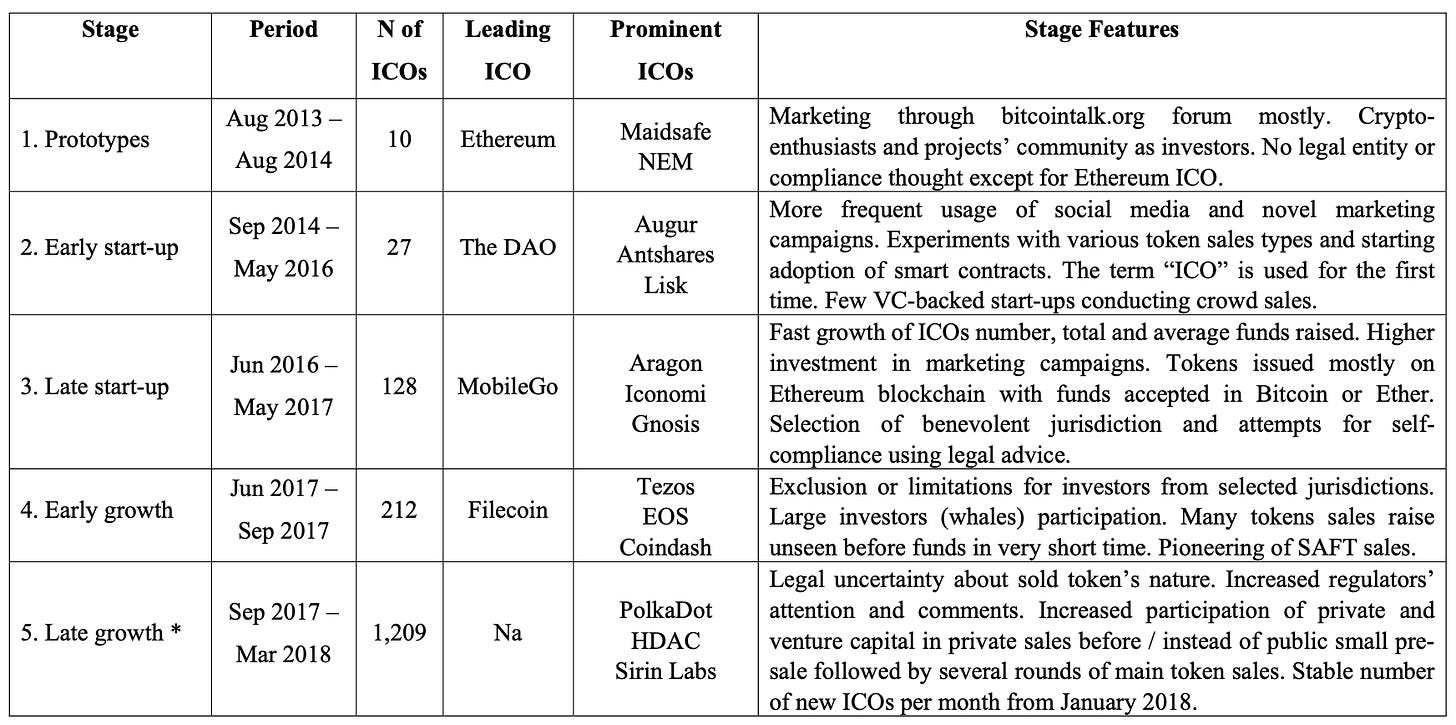
Evolution of ICOs from 2013 to 2018
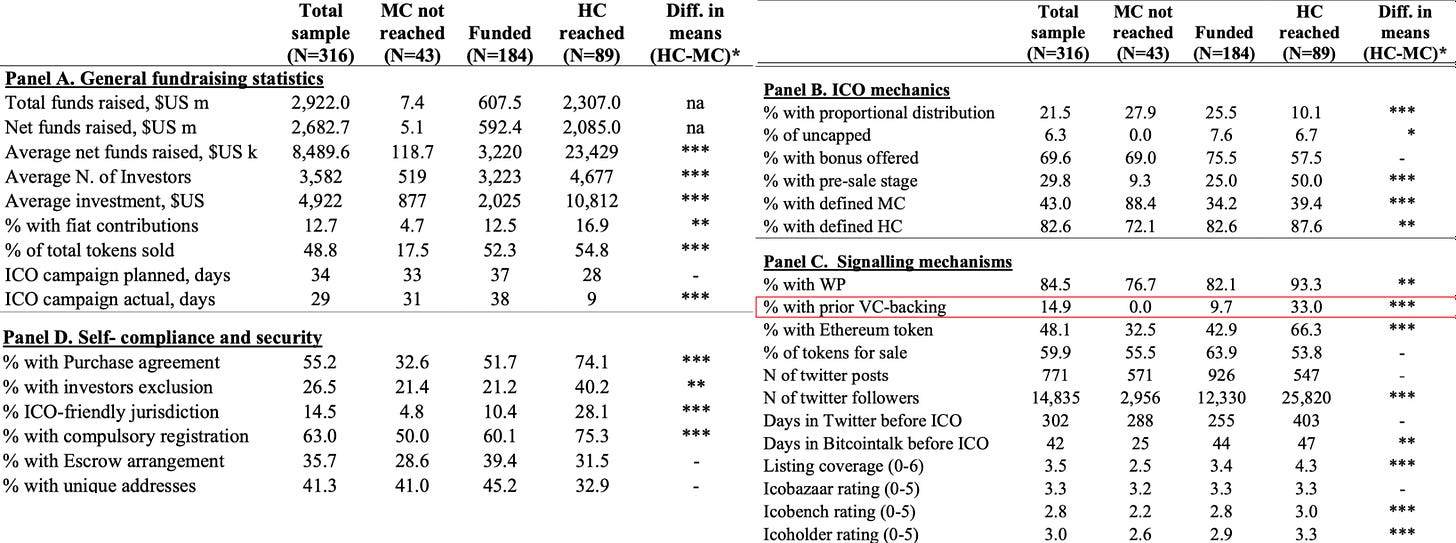
Empirical analysis of conducting ICOs or not conducting ICOs
- Total sample (N=316): 14.9% - Of the 316 ICOs analyzed, 14.9% received VC support before their launch, meaning approximately one in seven ICOs received VC support before token sales.
- Underfunded (did not reach minimum funding goal) (N=43): 0.0% - All underfunded ICOs did not receive VC support, indicating a possible connection between lack of VC support and failure to reach the minimum funding goal.
- Adequately funded (reached minimum funding goal) (N=89): 9.7% - Among adequately funded ICOs, 9.7% received VC support, indicating that nearly one in ten successful ICOs received VC support.
- Mean difference (average funding goal - minimum funding goal): 9.7% - Compared to underfunded ICOs, adequately funded ICOs with VC support had a significantly higher proportion, highlighting the positive impact of VC support on fundraising success.
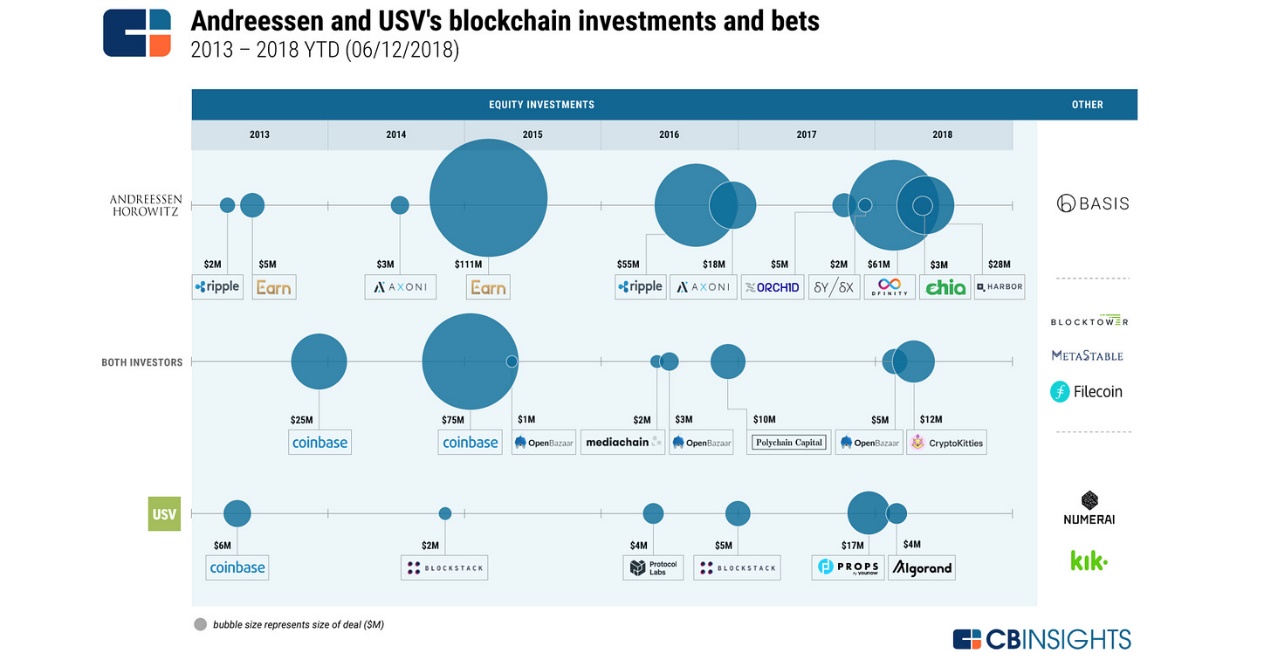
Equity investments by Union Square Ventures and Andreessen Horowitz from 2013 to 2018
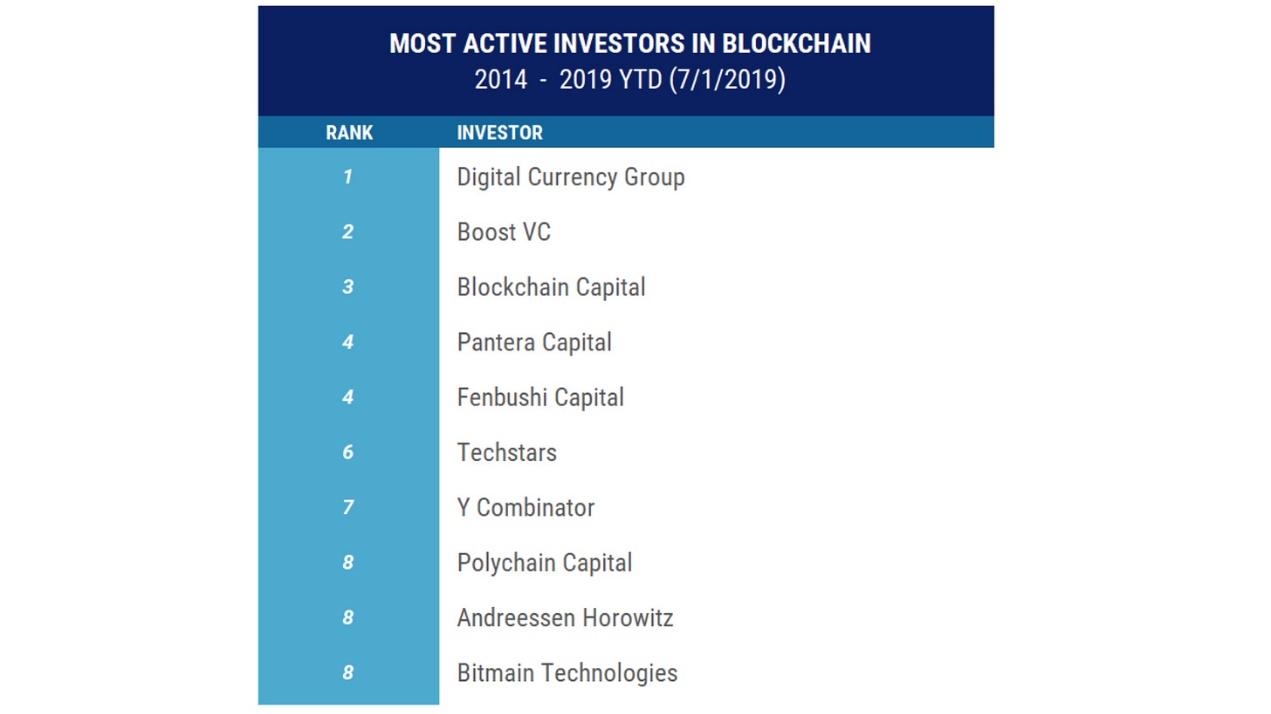
Most active investors list from 2014 to 2019
2019: The Prosperous Era Post-ICO
In 2019, the blockchain trading environment stabilized after the surge in 2018, with a total of 622 transactions amounting to $27.5 billion, surpassing the 322 transactions totaling $12.8 billion in 2017. The share of blockchain in VC transactions increased from 1.5% in 2017 to 2.8%, while seed and early-stage blockchain transactions increased from 1.8% to 3.6%. The median early-stage valuation for blockchain transactions was $12.5 million, 22% lower than the median for all investments.
The focus of blockchain transactions shifted in 2019, with 68% of investments categorized as fintech, lower than the 76% in 2017, indicating a broader application beyond "cryptocurrency." North America accounted for 45.3% of blockchain transactions, while Asia accounted for 26.8%, reflecting a more widespread global distribution.
In 2019, blockchain accounted for 2.8% of global venture capital investment and 1.1% of total capital, compared to 3.6% and 2.7% in 2018, respectively. The median valuation for transactions decreased from $16.6 million in 2018 to $13 million in 2019. Notable non-crypto blockchain companies included Securitize, Figure, PeerNova, and Spring Labs.
According to a CB Insights report, there were 806 global blockchain investment transactions in 2019, down from 822 in 2018, with a total investment of $4.26 billion. Zeroone Finance identified Digital Currency Group as the most active blockchain investor in 2019, with 14 investments, followed by Collins Capital, Coinbase Ventures, and Fenbushi Capital.
In 2019, investment institutions focused on cryptocurrency exchanges, gaming, digital wallets, digital asset management, smart contracts, and DeFi. Hong Kong mobile game developer Animoca Brands, listed on the Australian Securities Exchange, played a significant role in the blockchain gaming sector. FTX was established with strong support from Alameda Research.
The global enthusiasm for blockchain investment significantly declined in 2019, with traditional institutions becoming more cautious. The performance of investment institutions in the bear market reflects their cautious attitude.
2020 - 2021: Resurgence and Surge in Financing
In 2020, driven by the high potential for returns, blockchain venture capital became an important part of the global private equity market. Since 2012, over 942 venture capitalists have invested in over 2,700 transactions involving blockchain startups. The performance of top blockchain VC funds has consistently outperformed traditional VC funds and the broader tech industry.
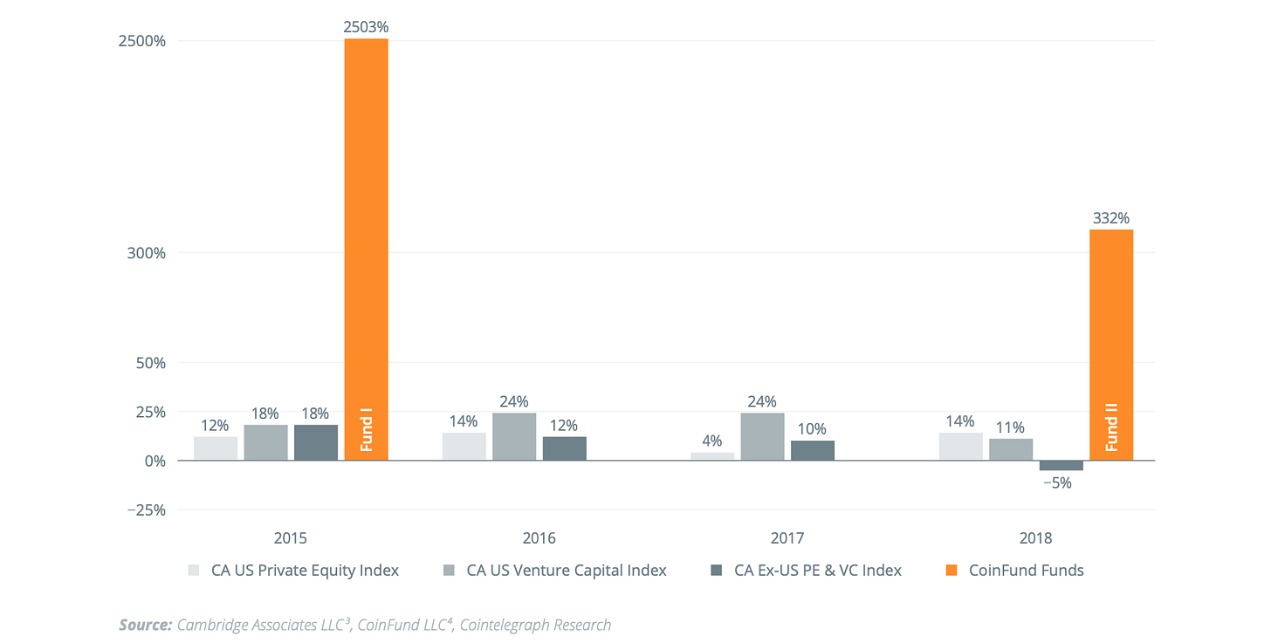
Performance comparison of blockchain private equity and traditional private equity (IRR since fund inception from 2013 to 2020)
Although blockchain private equity is important, it accounted for less than 1% of the global venture capital market, reaching approximately 2% during the crypto bull market in 2017.
Overall, blockchain venture capital has shown resilience and performed well in periods of market downturn. Its high potential for returns and diversification advantages make it an attractive choice for investors.
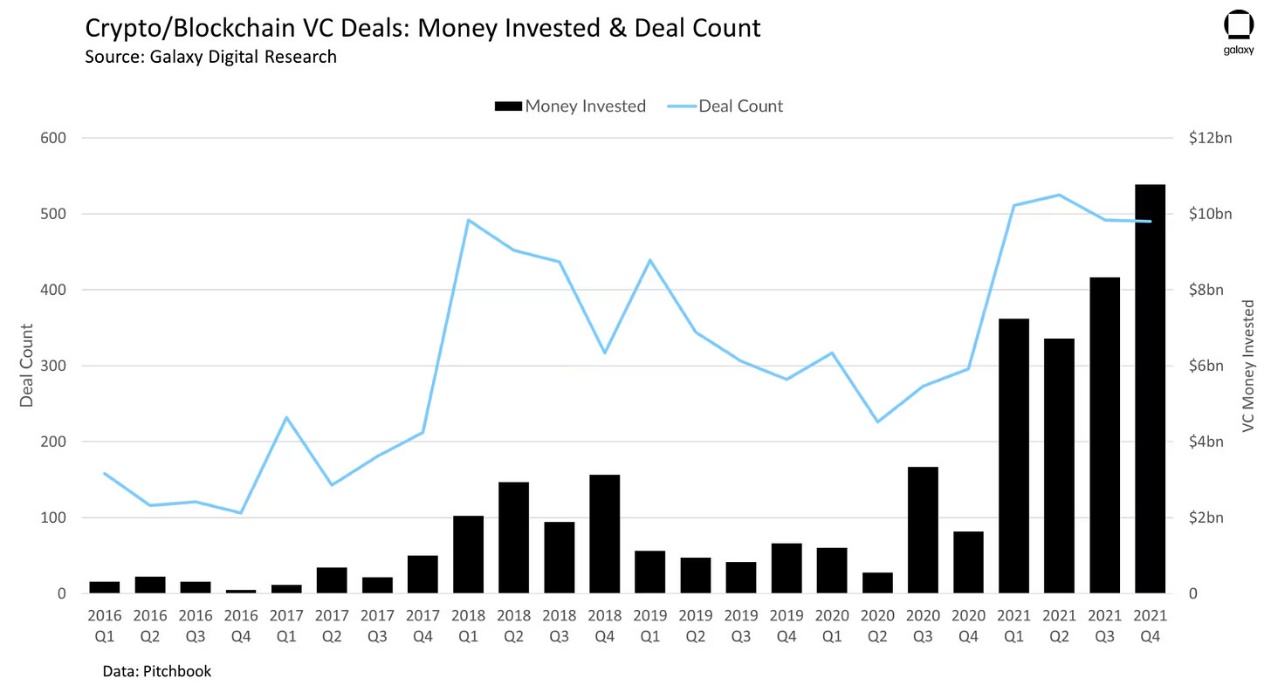
In 2020, DeFi began to receive widespread attention. According to PAData under PANews, the total investment and financing in the crypto industry was approximately $3.566 billion, similar to 2019. DeFi projects received $278 million, accounting for 7.8% of the total. Although the amount is relatively small, DeFi had the highest number of financings, with over a quarter of the disclosed 407 projects related to DeFi. This indicates a growing interest in this new type of native crypto project.
Prominent DeFi applications attracted significant investments in 2020. Uniswap completed a $11 million Series A financing, 1inch received $2.8 million in seed funding, and lending platform AAVE raised $25 million in Series A financing. Throughout the year, the total value locked in DeFi grew by nearly 210%, and the number of unique addresses increased tenfold. While these numbers may seem small compared to future data, the "DeFi summer" marked an important turning point.
Notably, native blockchain VC firms showed a preference for industry applications, especially DeFi, adopting a more aggressive, higher-risk approach. Each institution had its own investment strategy. According to the PAData report, over 700 institutions and individuals invested in blockchain projects in 2020, with NGC Ventures being the most active investor, followed by Coinbase Ventures and Alameda Research.
2021
As blockchain technology advances, global VC firms are increasingly recognizing the importance of blockchain, especially with the emergence of concepts like Metaverse and Web3. In 2021, blockchain startups raised approximately $33 billion in funding, the highest ever in history. According to PwC data, the average funding amount for crypto industry projects in 2021 reached $26.3 million.
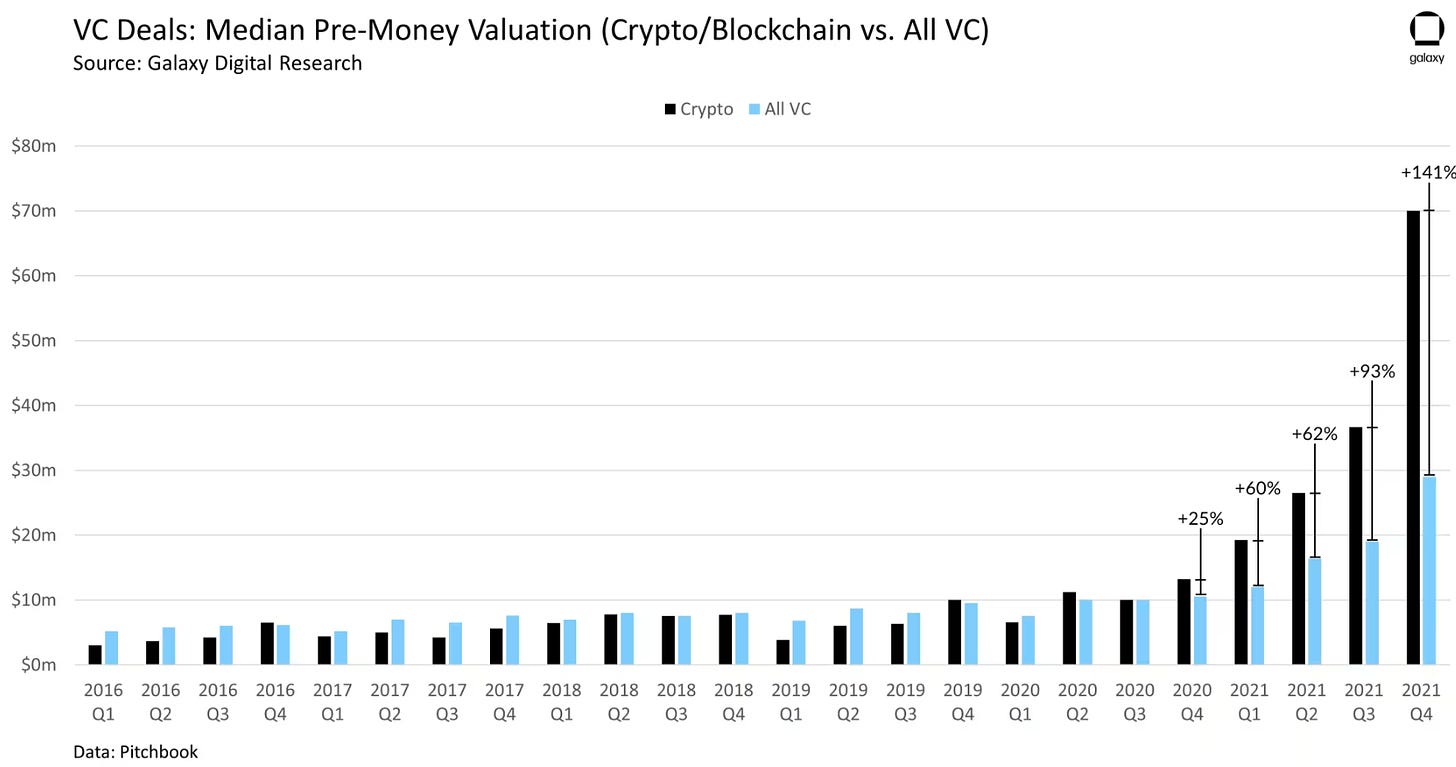
The number of blockchain venture capital transactions also reached a historic high in 2021, exceeding 2,000 transactions, double that of 2020. The frequency of later-stage funding increased, leading to 65 startups reaching or exceeding a valuation of $1 billion, reflecting the shift of the crypto market from a niche market to a mainstream market.
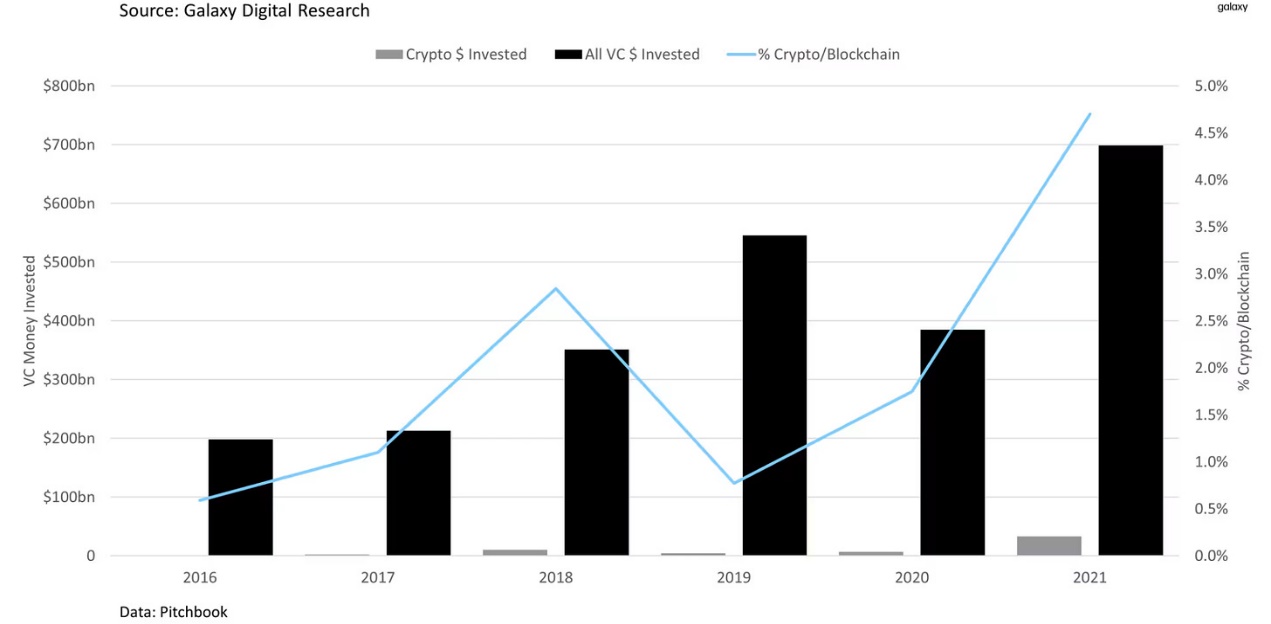
VC investment in crypto/blockchain vs total investment
Galaxy statistics show that in 2021, nearly 500 global blockchain VC firms reached their highest levels in terms of fund numbers and size. Major institutions such as Morgan Stanley, Tiger Global, Sequoia Capital, Samsung, and Goldman Sachs entered the blockchain market through later-stage equity investments, bringing ample funds to the market.
In 2021, the crypto space experienced a significant influx of new users and investments:
According to Gemini data, nearly half of the users in major crypto regions started investing in 2021.
Percentage of new users:
Latin America - 46% Asia-Pacific - 45% Europe - 40% United States - 44%
This influx laid a solid user base for the growth and development of crypto applications.
Key investments:
In July 2021, FTX announced a $9 billion Series B financing at a valuation of $18 billion, the largest private equity financing in crypto history. This round of financing involved 60 investment institutions, including SoftBank Group, Sequoia Capital, and Lightspeed Venture Capital.
Active investors:
Coinbase Ventures was the most active blockchain investment institution in 2021. After going public in the United States in April, the institution invested in 68 blockchain startups. Before going public, Coinbase raised nearly $547 million in 13 rounds of financing. Other notable investors include AU21 Capital (based in China), which invested in 51 companies, and a16z, which invested in 48 companies.
Venture capital:
In the fourth quarter of 2021, investments exceeded $10.5 billion, bringing the total venture capital investment in the cryptocurrency and blockchain sector to a record high of $33.8 billion, accounting for 4.7% of the total venture capital investment for the year. The number of transactions was also the highest, totaling 2,018, almost double that of 2020 and surpassing the previous record of 1,698 transactions in 2019.
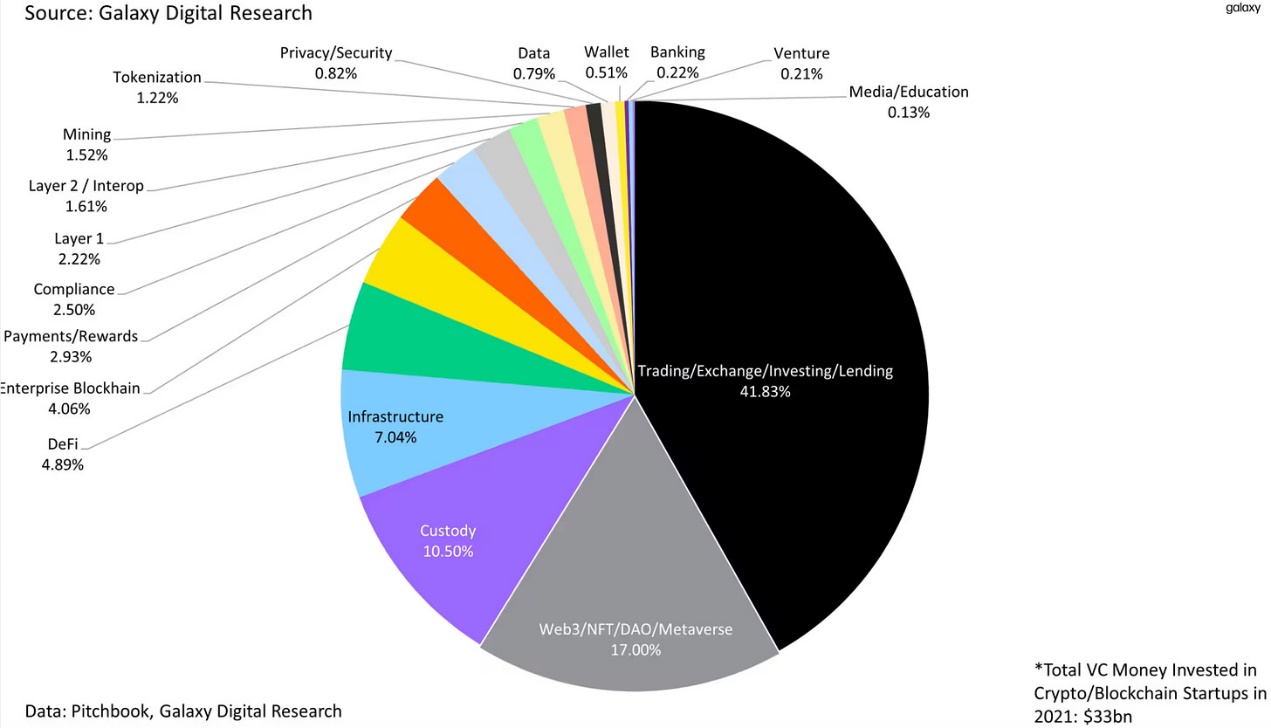
VC funding in cryptocurrency/blockchain in 2021 (by category)
In the $33.8 billion investment from VC in the crypto and blockchain sector, the largest portion went to companies providing trading, investment, exchange, and lending services, receiving over $13.8 billion (41.83%). More VC funds are investing in Web3 companies, including those developing NFTs, DAOs, metaverse tools, infrastructure, and games, accounting for 17% of the total investment.
2022 and 2023: Significant Decline in VC Investments
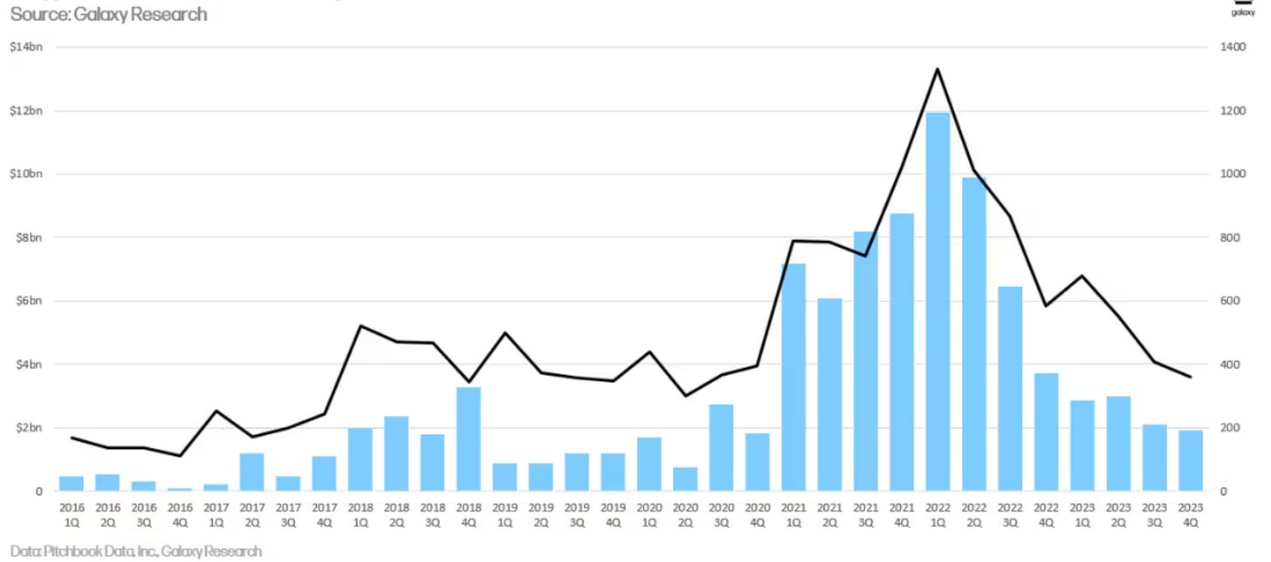
2022
Investment overview:
VC invested over $30 billion in crypto and blockchain startups, almost on par with the $31 billion in 2021. Investments peaked in the first half of the year, sharply declining in the third and fourth quarters. The number of transactions and capital investments in the fourth quarter of 2022 were the lowest in two years. Prominent VC firms that invested in FTX faced significant losses. Sequoia Capital wrote off its $200 million investment to zero, and Temasek's $320 million worth of FTX shares became "worthless."
Trends:
Later-stage companies received a larger share of capital, while seed-stage investments continued to decrease. Web3 led in the number of transactions, but trading and investment platforms raised the most funds. Transaction volume and median valuation reached their lowest levels since the first quarter of 2021.
VC funding:
2022 was the highest year for crypto VC funding, exceeding $33 billion, although the amount raised in the fourth quarter was the smallest since the first quarter of 2021. The average fund size increased, with over 200 funds raised, averaging over $160 million per fund.
2023
Investment overview:
Crypto VC investments significantly declined, accounting for only one-third compared to the previous two years. The number of transactions and investment capital hit new lows in each quarter.
Trends:
Early-stage companies dominated the majority of transactions, with a slight decrease in the share of pre-seed transactions in the second half of the year. Valuations and transaction volumes dropped to their lowest levels since the fourth quarter of 2020. Transaction companies raised the most funds, followed by Layer2 and interoperability, and Web3.
VC funding:
Facing challenges due to macroeconomic conditions and market turmoil.
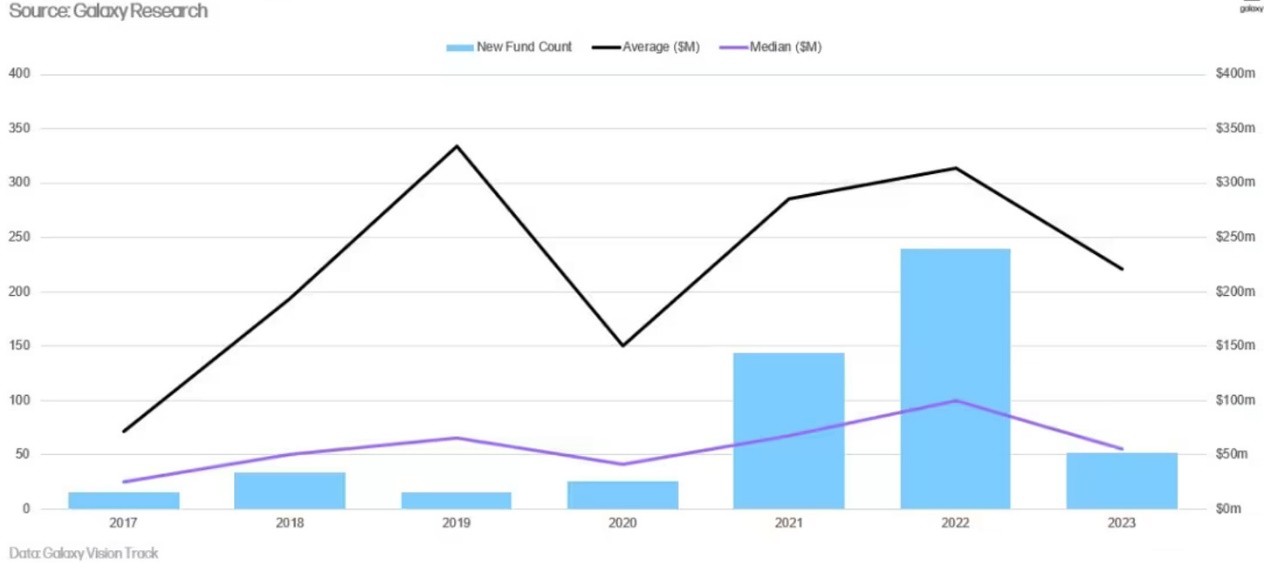
Size of crypto VC fundraising funds
The number of new crypto VC funds established in 2023 was the lowest since 2020, with the average fund size decreasing by 30% and the median fund size decreasing by 45%.
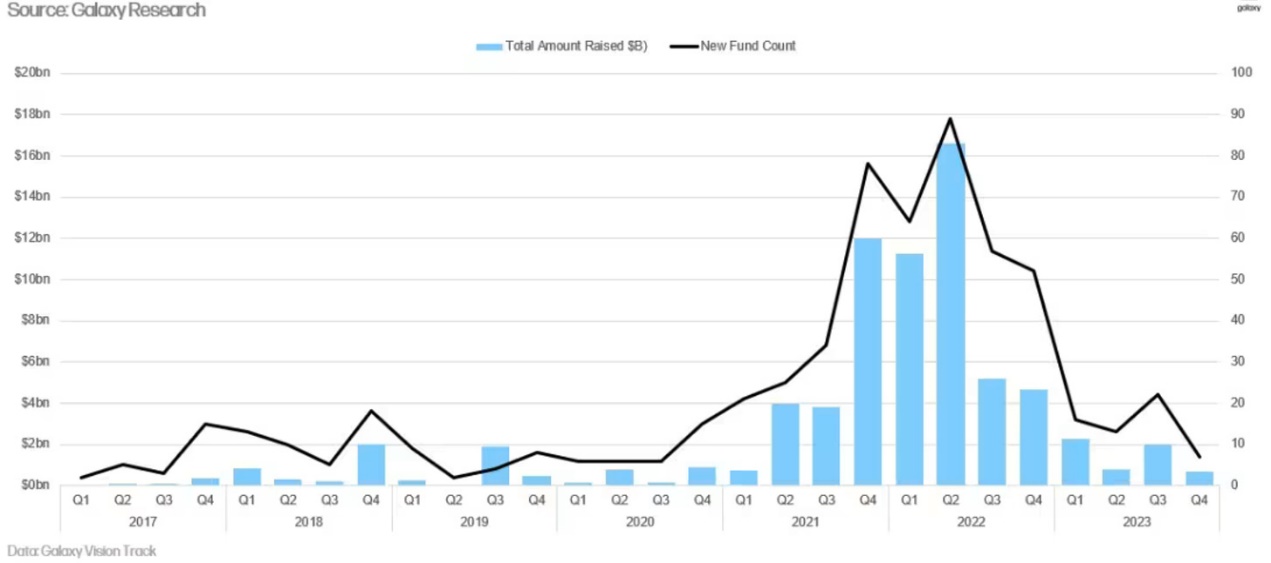
Interest and investment significantly declined in 2022 and 2023, especially in 2023. Nevertheless, Web3 continued to lead in the number of transactions, while trading platforms dominated in fundraising. Despite regulatory challenges, the United States remains the leader in the crypto startup ecosystem. Additionally, macroeconomic and market turmoil created a challenging environment for founders and investors, posing significant challenges to fundraising.
2024: VC Landscape
The venture capital landscape in the first and second quarters of 2024 has been detailed in previous articles. Here, the focus is on the continued trend since the end of the first quarter of 2021, with early-stage investments significantly surpassing later-stage investments.
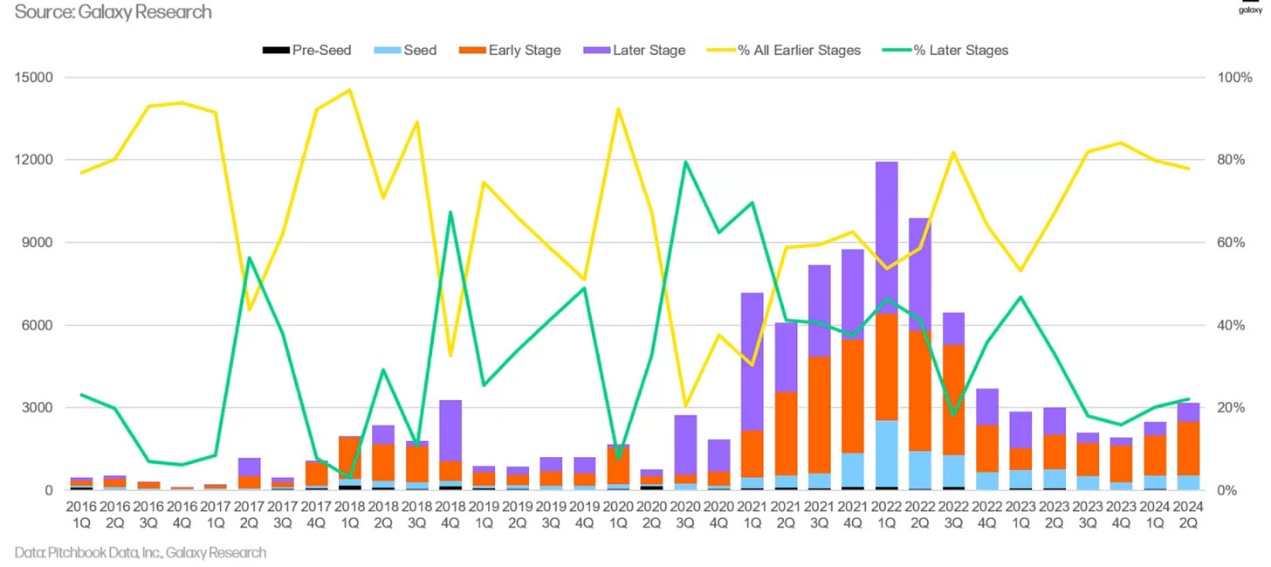
【Disclaimer】The market carries risks, and investment should be approached with caution. This article does not constitute investment advice, and users should consider whether any opinions, viewpoints, or conclusions in this article are suitable for their specific circumstances. Any investment made based on this information is at the user's own risk.
免责声明:本文章仅代表作者个人观点,不代表本平台的立场和观点。本文章仅供信息分享,不构成对任何人的任何投资建议。用户与作者之间的任何争议,与本平台无关。如网页中刊载的文章或图片涉及侵权,请提供相关的权利证明和身份证明发送邮件到support@aicoin.com,本平台相关工作人员将会进行核查。



